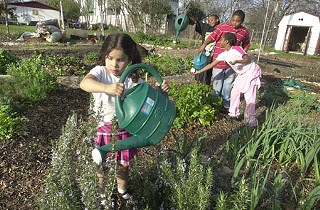Gardens Build Community
The Sustainable Food Center digs community gardens
By Kate Thornberry, Fri., April 18, 2008
Austin's first community garden was established in 1975, just around the time that forward-thinking people were becoming aware of the benefits of organic, locally grown food. Thirty years later, the greater nutritional value and fresher flavor of local, organic produce is well known, and Austin boasts 10 active community gardens, all of which have waiting lists.
Austin's community gardens are overseen by the Sustainable Food Center, an umbrella organization dedicated to promoting access to healthful, sustainable food. Through work with community and school gardens, workshops, and technical assistance, the Sustainable Food Center provides support and know-how to help get community gardens started.
Community gardens transform vacant, blighted urban lots into places of beauty and abundance. Most gardeners grow more than they can use, and the Sustainable Food Center encourages (and facilitates) sharing the overflow with food pantries, schools, and low-income neighbors. Invariably, as the community builds the garden, the garden builds the community.
"Everyone comes together in a spirit of cooperation, rather than competition," says Karen Banks, program director of Community and Youth Gardens at the Sustainable Food Center. "All of Austin's community gardens host events and provide a public place for residents to sit and relax. Once a month, there are community workdays for larger projects, such as maintenance of pathways, pruning orchards, and toolshed building.
"Not only are people getting their basic food needs met; the process invariably chips away at the powerlessness and isolation residents feel. A community garden usually ends up being 10 percent gardening and 90 percent community organizing," Banks affirms. "When neighbors get together to accomplish something, they realize that when they get together, they can accomplish things!"
Austin's relentless growth has put some established community gardens in jeopardy, as vacant lots are being sold and developed. Fortunately, the gardens have proven to be such catalysts for positive change that the Parks & Recreation Department is considering allowing community gardens on city-owned property. "Maintaining pressure on the City Council to plan for community gardens, and to change some of the ordinances regarding them, is our next challenge," Banks explains. "Communities thrive where community gardens bring residents together."











